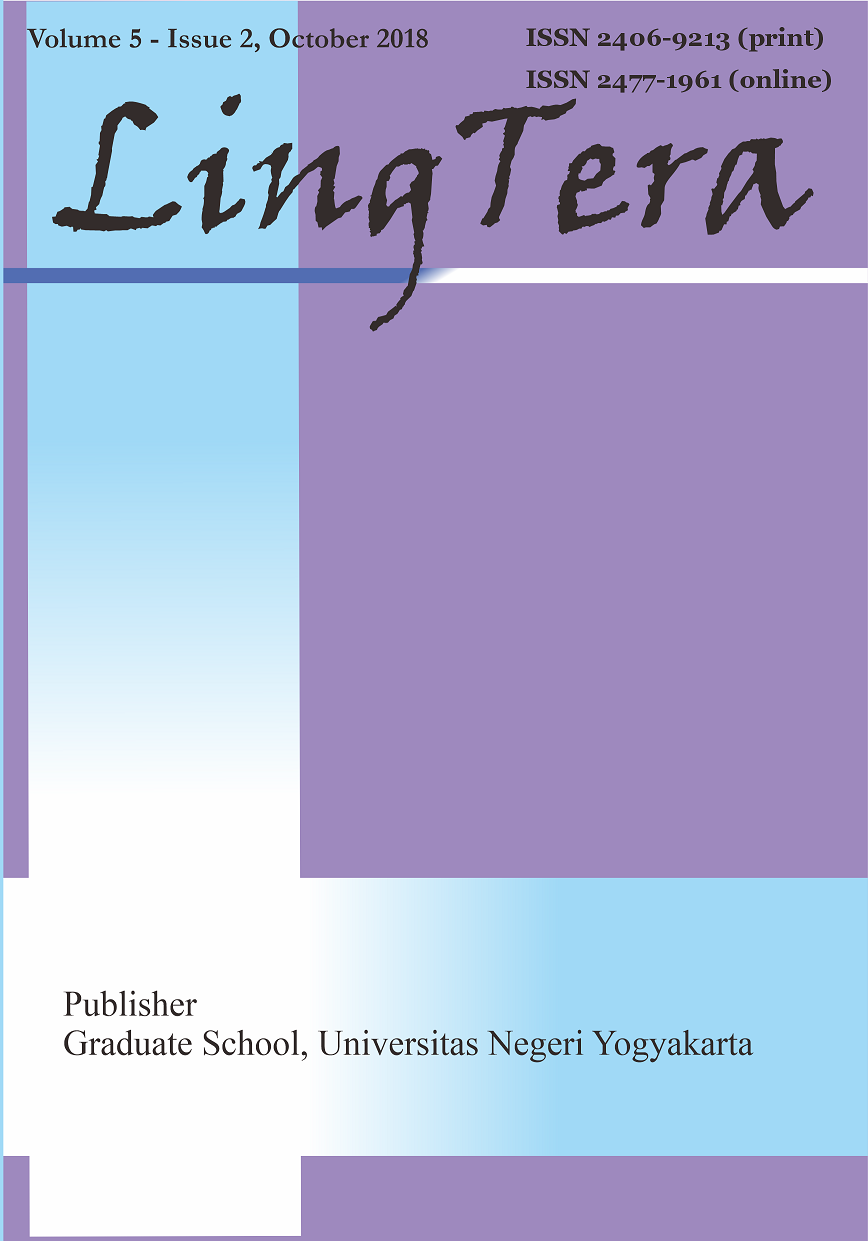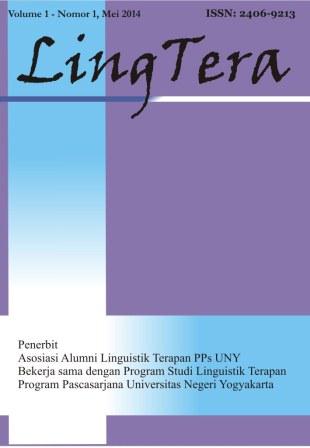The influence of higher order thinking skills, vocabulary mastery and reading motivation on reading comprehension achievement
DOI:
https://doi.org/10.21831/lt.v6i2.7513Keywords:
Higher Order Thinking Skills, HOTSs, vocabulary mastery, reading motivation, reading comprehension achievementAbstract
This research aims at finding out the influence of Higher Order Thinking Skills (HOTSs), vocabulary mastery and reading motivation on reading comprehension achievement among State SMP Students in Magelang Regency. This research was an ex post facto design. The sampling technique was the proportional cluster random sampling. The research instruments were tests and a questionnaire. The data were analyzed using the multiple regression analysis continued by the partial correlation. The result of the multiple regressions indicates that HOTSs, vocabulary mastery and reading motivation influence reading comprehension achievement with the F=236.709 which means that significantly on reading comprehension achievement. The contribution of HOTSs on reading comprehension achievement is 38.7%, vocabulary mastery is 50.3%, and reading motivation is 8.2%.
References
Asplund, S.-B. (2012). Being a skilled reader: Reception patterns in vehicle engineering students' literature discussion. Education Inquiry, 3(2), 243–257. https://doi.org/10.3402/edui.v3i2.22032
Benigeri, M. (2003). Shortcomings of health information on the Internet. Health Promotion International, 18(4), 381–386. https://doi.org/10.1093/heapro/dag409
Cheng, H. (2012). K. Koda and A. M. Zehler (Eds.): Learning to read across languages: cross-linguistic relationships in first- and second-language literacy development. Reading and Writing, 25(2), 611–617. https://doi.org/10.1007/s11145-010-9280-9
Coiro, J., Knobel, M., Lankshear, C., & Leu, D. J. (2014). Central issues in new literacies and new literacies research. In Handbook of research on new literacies (pp. 19–40). Routledge.
Grabe, W., & Stoller, F. L. (2012). Reading and vocabulary development in a second language: A case study. In Second Language Vocabulary Acquisition (pp. 98–122). https://doi.org/10.1017/cbo9781139524643.009
Kementrian Pendidikan dan Kebudayaan Republik Indonesia. (2017). Rekap hasil Ujian Nasional (UN) tingkat sekolah.
McNamara, D. S. (2012). Reading comprehension strategies. https://doi.org/10.4324/9780203810033
Richards, J. C., & Renandya, W. A. (2002). Methodology in language teaching: An anthology of current practice. Cambridge University Press.
Romafi, R., & Musfiroh, T. (2015). Hubungan minat membaca, fasilitas orang tua, dan pemberian tugas membaca dengan kemampuan membaca pemahaman siswa. LingTera, 2(2), 185. https://doi.org/10.21831/lt.v2i2.7377
Scanlon, D. M., Anderson, K. L., & Sweeney, J. M. (2010). Early invention for reading difficulties. New York, N.Y.: The Guilford Press.
Stuart, M. (1995). Prediction and qualitative assessment of five-and six-year-old children's reading: a longitudinal study. British Journal of Educational Psychology, 65(3), 287–296. https://doi.org/10.1111/j.2044-8279.1995.tb01150.x
Sugirin, S. (2013). Hakikat reading dan implikasinya bagi pembelajaran. Yogyakarta: Universitas Negeri Yogyakarta.
Syahputra, I. (2006). Strategi pembelajaran bahasa Inggris sebagai bahasa asing dalam meningkatkan kemampuan berbahasa siswa. Kutubkhanah: Jurnal Penelitian Sosial Keagamaan, 17(1), 127–145. Retrieved from http://ejournal.uin-suska.ac.id/index.php/Kutubkhanah/article/view/813
Van Wijnendaele, I. (1998). Reading in a second language. Psychologica Belgica, 38(3-4), 149–161. https://doi.org/10.1093/oxfordhb/9780195384253.013.0006
Zuchdi, D. (2008). Strategi meningkatkan kemampuan membaca: Peningkatan komprehensi. Yogyakarta: UNY Press.
Downloads
Published
How to Cite
Issue
Section
Citation Check
License
LingTera allows readers to read, download, copy, distribute, print, search, or link to its articles' full texts and allows readers to use them for any other lawful purpose. The journal allows the author(s) to hold the copyright without restrictions. Finally, the journal allows the author(s) to retain publishing rights without restrictions.
- Authors are allowed to archive their submitted articles in an open-access repository.
- Authors are allowed to archive the final published article in an open-access repository with an acknowledgment of its initial publication in this journal.

Psychology, Evaluation, and Technology in Educational Research is licensed under a Creative Commons Attribution-ShareAlike 4.0 International License.
Based on a work at https://petier.org/index.php/PETIER.










